The euphoria generated by results of the January 2015 presidential polls in Sri Lanka has gradually evaporated. The country is heading towards a complex political situation not originally envisaged by any of the principal actors. The focus is now on four stalwarts including the incumbent President Maithripala Sirisena.The others are former Presidents Chandrika Bandarnaike Kumaratunga, Mahinda Rajapaksa and the current Prime Minister Ranil Wickremesinghe.
While President Maithripala Sirisena is assured of completing his tenure, the others will have to fight a tough political battle to remain relevant or retain importance especially, when the country is poised towards far reaching constitutional and political changes. To his immense credit, President Sirisena has remained loyal to his election manifesto, as witnessed by several changes made immediately following his inauguration. The recent passage of the 19th Amendment to the Constitution is an important landmark. There are other equally significant ones on the anvil. He has at multiple times stressed the importance of political stability in the country and in this direction the role of Ranil Wickremesinghe as head of government.
Need for reconciliation:
There are different schools of thought on the future of the politics of rapprochement initiated by the present political leadership under President Maithripala Sirisena. One definite pointer is on the need to strengthen the process of reconciliation in both constitutional and political terms so as to address the desires and aspirations of the minorities, both Tamil and the Tamil speaking Muslim community. The appointment of former President Chandrika to head a special presidential task force on reconciliation is a step in the right direction. Observers add that the Indian Origin Tamils (IOT) community too needs redress of its own set of problems. The Task Force will, no-doubt, require support of the cross-section of the community cutting across political spectrum to deliver acceptable and workable solutions.
Battle of political figures:
All major political parties meanwhile are grappling with their internal issues and also preparing to face what could be a decisive period in the post-conflict period. The Sri Lanka Freedom party (SLFP) has to contend with the enigmatic personality of Mahinda Rajapaksa, who has several years of active political life ahead. The former President can still be the kingmaker, if he chooses to do so. The manner in which he became the party chief in 2005 is a classic example of his political acumen which he retains even now. Criminal cases against his brothers Basil and Gotabaya and others may well cause the Rajapaksa camp to close ranks and bide their time. That said, the popularity of the Rajapaksas cannot be discounted. However, Mahinda Rajapaksa, for reasons best known to him, has failed to elevate himself from the role of a master strategist to national statesman. He had everything going for him till the desire for absolute power caused his downfall. On the other hand, Chandrika Kumaratunga may not be the power that she was several years ago. It is doubtful if she has forgotten or forgiven the manner of her ouster from the top party post and the presidency. The SLFP therefore has a tough balancing act on its hands. The next couple of weeks will perhaps provide the compass to its future direction. The SLFP is now caught in a bind as it has to carefully deal with three power centers in Chandrika Kumaratunga, Rajapaksa and Sirisena.
The UNP, which is the senior partner in the current government, is not without its share of problems. The leadership issue is of paramount importance. Ranil Wickremesinghe is no doubt the frontrunner in the leadership race. There are others who have aspired for the top posts in the party as also in the parliamentary group. They are biding their time for the opportunity to oust Wickramasinghe. Outside the UNP, the chances of a Ranil tie-up with Chindrika may well be on the cards. Both may need each other to remain politically strong in the run up to the next parliamentary polls. In fact the continuing popularity of Mahinda Rajapaksa will be the main reason for them to close ranks.
Tamil scenario:
In the Northern Province, the scars of the civil war are healing slowly. The post conflict period of relief and rehabilitation is over and the process of redevelopment is underway. Politically speaking, there is considerable ground to be covered. The four-party Tamil National Alliance (TNA) is yet to come to terms with the reality of post-Prabhakaran period and importantly address political issues and to create an effective second line of leaders. The TNA has to step up to the plate and seriously contemplate its new role and responsibility. It withstood the overwhelming dominance of the Liberation Tigers of Tamil Eleam (LTTE) remarkably well. It is under no duress or threat now from any quarter. Obviously, the TNA has a major role in the process of rapprochement and has to earnestly build bridges with the current dispensation. Failure by the TNA leadership to grasp opportunities created by the current situation will only be to its detriment and the community it represents.
R. Sampanthan continues to remain the tallest TNA leader and his influence over the Tamil discourse is evidently an important factor. Sampanthan’s deep knowledge of the subject and proximity to leadership on both sides of the Palk Straits is well known and so are his expectations equally of them. For India, there is considerable comfort with him in the saddle. He needs to look to a new point of contact to carry forward the dialogue with the relevant stakeholders. A senior politician who holds the trust of both sides and the Tamil community will have to be identified and groomed for the task. Several political analysts tend to question the efficacy of the TNA in handling sensitive matters due to personality and perception issues. While it is left to the TNA to burnish its credentials locally in Sri Lanka, it has to cover considerable distance with India and improve the trust factor. India may also need to identify and cultivate the best among them.
Minorities:
There is unanimity in the assessment of leading observers that the minorities “faced the music” in the post-May 2009 period, especially following the violent end of the LTTE. It is a fact that the then Colombo government did not have an effective post-conflict contingency plan, on the same lines what India had following the Peace Accord with the Mizo National Front (MNF) in June 1986.
Unfortunately in Sri Lanka, there was no peace dividend for the minority communities. The previous regime failed to rein in extremist political elements and anti-Tamil chauvinistic party such as Jathika Hela Urumaya (JHU) as also the Buddhist radical group namely the Bodu Bala Sena (BBS). It will be remembered that the JHU was a member of the then government. Attacks on places of worship by these groups incited communal tensions at regular intervals due to an administration, which controversially remained a mute spectator. Mahinda Rajapaksa of course paid dearly for dereliction of responsibility in protecting the minorities.
The minorities constitute between in Sri Lanka constitute about 25-30 per cent of the population and have considerable role to play in electoral politics. Efforts would therefore be necessary for the government of President Sirisena to ensure that the benefit of peace dividend is extended to the minority communities. Further, an assurance that the law will severely deal with petty chauvinistic groups intent on vitiating the communal harmony. The minorities require assurance of safety, security and equal opportunities from the highest political authorities in the country.
13th Amendment:
The debate on the full implementation of the XIII amendment has been a matter of national concern and international interest ever since its promulgation nearly 30 years ago. It continues to hold center-stage even now. The two major political forces in the country, namely the Sri Lanka Freedom Party (SLFP) and United National Party (UNP) have a huge stake in addressing its constitutional and political requirements. The Tamil community, as also the Muslim community, holds the political balance in the Northern and Eastern provinces respectively. In any future redrawing of parliamentary constituencies or raising the strength of the Parliament to 250, the minority parties may have chances of improving their clout. The Tamil community has received support from the top leadership of country. However, full Implementation of the 13th Amendment is need of the hour. There should be no compromise on it. It is for the benefit of the entire country and benefits should flow equally. But, as admitted by politicians, academics and legal experts, the devolution of revenue and police powers to the provinces remain the bone of contention. This has seriously impacted the process of reconciliation.
Removal of the irritants is this necessary. But what are the realistic options? There are many to consider. The threat of terrorism no longer exists and there is no chance of its recurrence.So it should not be cited as an impediment. The situation has changed radically in post-January 2015 period. It will be recalled that during the tenure of Mahinda Rajapaksa, the JVP took the legal route to demerge the Eastern provincial council from the North. While the demerger assuaged the security concerns of Sinhala parties such as JVP, it became precursor for restoration of the democratic process in the formerly troubled provinces. Recently, the Government had sought opinion of the Supreme Court on matters pertaining to the 19th amendment. The government now has a Supreme Court mandate to call a referendum on transfer of powers of the Executive President to the Parliament and on the independence of media. It would therefore be worthwhile to revisit and strengthen if necessary, the constitutional position of 13th amendment on devolution of revenue and police powers in the light of contemporary developments.
Jayampathy Wickremaratne, the parliamentarian, who drafted the 19th amendment, has proposed writing of a new constitution. In an interview with The Hindu (May 05, 2015), he argued in favor “of stronger provincial councils and power sharing at the Centre.” He added that “this should be done to strengthen the Centre without weakening the periphery”. He advocated that a new statute should include a fresh bill of rights and address the issues of devolution of powers to provincial councils and sharing of powers with the central government. The door on full devolution of powers is still open as per the above interview of Jayampathy Wickremaratne.
According to a diplomatic correspondent with long experience of covering Sri Lanka, the need of the hour is to strengthen Sri Lanka’s secular credentials in a manner that equal rights and opportunities are available to its citizens from all walks of life. The Chandrika Kumaratunga-headed special task Force on Reconciliation will have to address this important aspect and bring about relevant recommendations.
Mechanism for sharing revenue and police powers:
Politically too, there is the need to consider creation of a revenue sharing mechanism between the Centre and the provinces. This will be in line with the provisions of the 13th amendment. A Finance Commission based on the Indian model may be one option. The other could be under the aegis of Central Bank of Sri Lanka to monitor revenue generation and expenditure. There was a fear during the civil war that affected provinces could misuse the revenue powers. The situation has radically changed and any chance of misuse for anti-national purpose is remote.
Another area is to strengthen police administration in the provinces by a well calibrated process of decentralization as the first step. A central police force may also be established on the lines of India’s Central Reserve Police Force, which will relieve the military of its internal security charter. It is important for the downsizing of the military gradually and considering outsourcing more army units on UN and other assignments.
India factor:
The inauguration of the Bharatiya Janata Party (BJP) led National Democratic Alliance (NDA) in May 2014 and the election of President Maithripala Sirisena in January 2015 has reset the compass on bilateral relations. The positive impact of Prime Minister Modi’s visit to Sri Lanka, the first by an Indian Head of Government in 28 years, was unprecedented in character and substance. It has helped to revive the sagging relationship. That said, President Sirisena’s maiden visit as Head of State to Delhi is equally important especially for the personal chemistry between the two leaders as also for the several assurances given by him on matters of mutual interest.
India-Sri Lanka relations are based on mature strategic calculations. This was evident especially during the period 2001-2004, when Ranil was Sri Lanka Prime Minister. New Delhi too had established an excellent rapport with him. It will be recalled that the slide began in April 2004 when Ranil lost the parliamentary elections and India voted a Congress led government into office the same year. The period under Mahinda Rajapaksa for ten years saw stagnation in political and diplomatic terms.
In the prevailing situation, India obviously needs to carefully calibrate its response to developments in Sri Lanka. The first priority should be to look at the irritants that have held the relationship to ransom. The fishermen issue has to be tackled earnestly directly between New Delhi and Colombo without provincial governments on both sides getting into the act. Local political compulsions in India and Sri Lanka must be taken into account but not allowed to dictate the trajectory of talks.
The government of India may also need to examine role of the TNA especially that of some of its leaders. India’s position on the 13th amendment must be made clear to them as also importance of the Indo-Sri Lanka Accord of 1987. India’s views can also be articulated by conferences, seminars and workshops on the subject involving stakeholders on both sides of the border. Public discourse on the broad spectrum of India-Sri Lanka relationship is an inescapable activity. There is hardly any debate in India or Sri Lanka on it. With Sri Lanka set on a series of constitutional and political changes, it will be very useful for dissemination of ideas and views. India must involve the cross section of Sri Lanka representatives in such a dialogue.
Meanwhile, the relationship with the TNA must require a thorough review from a national interest point of view and not necessarily from local Tamil Nadu perspective. The situation in the IOT areas calls for an efficient mechanism to help overall development of this community. The present IOT leadership needs an efficient second line of leaders who can gradually take over from the present lot.
The thorny issue of devolution of powers as envisaged under the 13th amendment will no-doubt occupy considerable space in weeks to come. Prime Minister Modi has indicated India’s views on it during his recent visit to Sri Lanka. The situation of the minorities is important and needs constant attention of Delhi. The Indo-Sri Lanka Accord 1987 is an all encompassing document that needs more attention. Time has come to expand it to a Comprehensive Partnership Agreement to take forward the economic, political, strategic, defense and cultural aspects in a well-organized manner. For the first time in a decade, India has a team of friendly interlocutors in Sirisena and Ranil. India’s past friendship with Chandrika is well understood. Like-wise, Sri Lanka now has the comfort level to relate with Delhi, which is not shackled to coalition politics. Both countries have five years of political stability to build better relations and make up for lost opportunities.
(PM Heblikar is Managing Trustee, Institute of Contemporary Studies Bangalore (ICSB) and former Special Secretary in the Cabinet Secretariat with long stints in Sri Lanka and Myanmar)
Published in Vivek: Issues & Options, March - April 2015 Image Source: http://zeenews.india.com




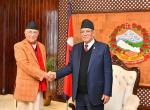
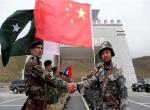

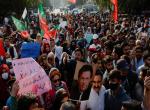
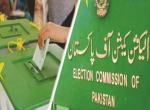
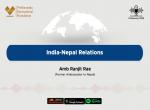
Post new comment